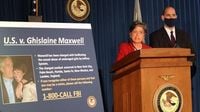The U.S. Supreme Court has declined to hear Ghislaine Maxwell’s appeal seeking to overturn her conviction and 20-year prison sentence for her role in the notorious sex-trafficking scheme orchestrated alongside Jeffrey Epstein. The high court’s decision, delivered on October 6, 2025, leaves Maxwell’s conviction intact and closes a major chapter in a legal saga that has gripped the public and political spheres for years. The justices offered no explanation for their refusal, a customary practice in such cases, but the ripple effects of their decision are already being felt across the country.
Maxwell, once a British socialite and longtime associate of Epstein, was convicted in 2021 for recruiting and grooming underage girls—some as young as 14—for Epstein to exploit between 1994 and 2004. Prosecutors described her as a key player in a scheme that lured vulnerable girls with promises of opportunity, only for those promises to end in abuse. According to BBC, Maxwell’s conviction followed a high-profile trial in New York, where she was found guilty of multiple counts related to sex trafficking and conspiracy.
The crux of Maxwell’s appeal centered on a 2007 non-prosecution agreement (NPA) negotiated between Epstein and the U.S. Attorney’s Office in the Southern District of Florida. This agreement, reached after a federal investigation into Epstein’s sexual abuse of minors, stipulated that if Epstein fulfilled its terms, he would not be prosecuted "in this district," referring to Florida. It also included a so-called co-conspirators clause, pledging that the U.S. would “not institute any criminal charges against any potential co-conspirator of Epstein, including but not limited to” four named assistants. Maxwell’s legal team argued that this clause should have barred her prosecution in New York, even though she was not explicitly named in the agreement.
The government, however, maintained that the NPA was geographically limited to Florida and did not bind federal prosecutors in other districts, including those in Manhattan who ultimately brought the case against Maxwell. As CBS News reported, the U.S. Court of Appeals for the Second Circuit had previously ruled that “nothing in the text of the NPA precluded” the U.S. Attorney’s Office in New York from moving forward with charges. Solicitor General D. John Sauer, representing the government, emphasized that Justice Department policy at the time required written approval for agreements binding other districts—approval that was never sought or granted in this case.
Maxwell’s attorney, David Oscar Markus, expressed deep disappointment at the Supreme Court’s refusal to intervene. “We’re, of course, deeply disappointed that the Supreme Court declined to hear Ghislaine Maxwell’s case,” Markus said in a statement provided to Axios and BBC. “But this fight isn’t over. Serious legal and factual issues remain, and we will continue to pursue every avenue available to ensure that justice is done.” Maxwell’s family echoed this sentiment, announcing plans to file a habeas petition in the Southern District of New York, where she was convicted, and vowing to keep fighting for her release.
For survivors and the families of Epstein’s victims, the Supreme Court’s decision was a moment of vindication. The family of Virginia Giuffre, a prominent survivor, told Axios and BBC they were “committed to ensuring that convicted child sex trafficker Maxwell serves out the entirety of her 20-year sentence in prison, where she belongs.” Jess Michaels, another survivor, described the ruling as a “desperately needed reminder that convicted pedophile sex traffickers belong behind bars.” She added, “Given the current political climate, I’m pleasantly surprised to see the safety of children finally prioritized over protection of powerful abusers.”
The case has remained a political flashpoint, with bipartisan scrutiny over the handling of Epstein’s prosecution, the terms of his plea deal, and the Trump administration’s approach to the release of related files. Former President Donald Trump, when asked about the Supreme Court’s decision and the possibility of a pardon for Maxwell, told reporters he was unaware of the court’s action and would consult with the Department of Justice before considering clemency. “I’m going to have to take a look at it. I have to ask DOJ,” Trump said, according to ABC News. “I didn’t know they rejected it. I didn’t know she was even asking for it, frankly.” The White House, through press secretary Karoline Leavitt, reiterated on Monday that “no leniency is being given or discussed” for Maxwell and that “we don’t comment on clemency requests.”
Maxwell’s legal battles have unfolded against a backdrop of public demands for transparency. The files surrounding Epstein’s case, including grand jury materials, have become the subject of intense debate, with Congress and the Department of Justice facing calls to unseal thousands of pages of records. Senior Justice Department officials, including Deputy Attorney General Todd Blanche, have been involved in ongoing inquiries. In July 2025, Blanche conducted two days of interviews with Maxwell, who denied seeing any inappropriate conduct by Trump during his interactions with Epstein and expressed skepticism about the official conclusion that Epstein died by suicide in 2019.
Following her interview with federal officials, Maxwell was transferred from a facility in Tallahassee, Florida, to FPC Bryant, a minimum-security women’s prison in Texas, located about 100 miles from Austin. This move sparked outrage among survivors and their families, who argued that Maxwell should serve her sentence in a maximum-security prison. In a statement shared with BBC, Giuffre’s family said they “remain hopeful that the DOJ will realize that she belongs in a maximum security prison, not the country club one she is currently in.”
The 2007 non-prosecution agreement that underpinned Maxwell’s appeal has itself come under scrutiny. Alex Acosta, the U.S. Attorney who negotiated the deal, later served as labor secretary under President Trump but resigned amid criticism of his handling of the Epstein case. The agreement allowed Epstein to plead guilty to lesser state charges and serve an 18-month sentence, a decision widely condemned as too lenient given the scope of his crimes. As CBS News noted, the provision covering co-conspirators was “highly unusual,” and some involved in the negotiations later said they did not anticipate the possibility of protecting individuals beyond the four named assistants.
Maxwell’s conviction, and the Supreme Court’s decision to uphold it, mark a significant moment in the ongoing reckoning with the legacy of Epstein’s crimes. While some legal avenues remain for Maxwell, including the planned habeas petition, the path to overturning her conviction has narrowed considerably. For survivors and advocates, the focus now shifts to ensuring that justice is fully served and that the broader network of those complicit in Epstein’s abuse is held accountable.
As legal and political battles continue to swirl, the Supreme Court’s decision stands as a clear signal that, at least for now, the law will not bend to powerful interests or technical loopholes. Maxwell remains behind bars, and the fight for accountability presses on.



